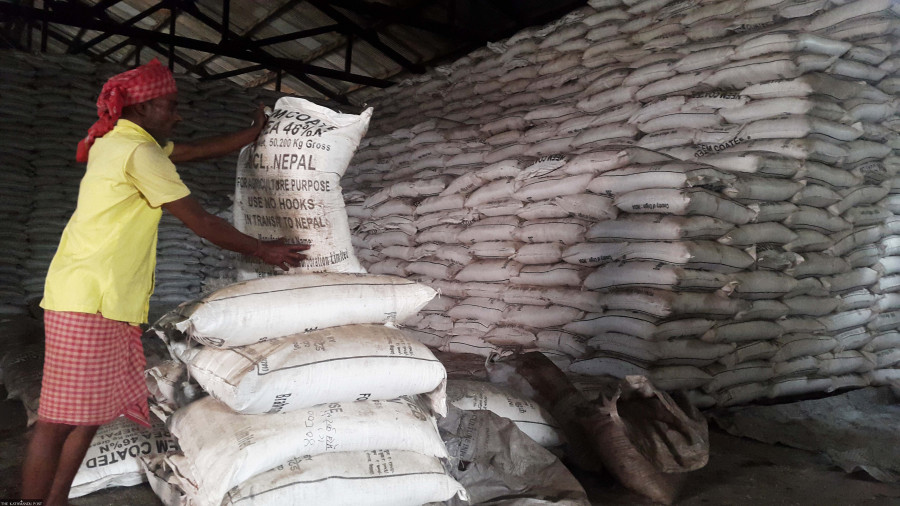Money
Government allocates record Rs15 billion to ensure fertiliser supply
The budget may be enough to procure 350,000 tonnes, still 50,000 tonnes short of the desired 400,000 tonnes, officials said.
Sangam Prasain
The government has set aside a record Rs15 billion for its fertiliser subsidy programme this year, fearing steep price rises in the world market may result in shortages which have been a familiar suffering for Nepali farmers.
But government agencies tasked with the procurement of plant nutrients say the record-high budget is still short by Rs5 billion, and they may not be able to import adequate amounts if they do not start making preparations well in advance this fiscal year 2021-22 which ends mid-July.
Due to soaring world prices which have almost doubled in a year, nearly two dozen suppliers have pulled out of their contracts, which means there could be a scarcity of chemical fertiliser during the crucial transplantation season of paddy in June and other crops next year, insiders say.
The incumbent Sher Bahadur Deuba administration has allocated an extra budget of Rs3 billion to finance chemical fertiliser imports on top of the Rs12 billion set aside by the erstwhile KP Sharma Oli administration.
“We have been informed that an additional budget of Rs3 billion has been allocated for chemical fertiliser imports,” said Prakash Kumar Sanjel, spokesperson for the Ministry of Agriculture and Livestock Development.
The ministry has estimated that the annual demand for fertiliser stands at around 600,000 tonnes.
This extra money could finance the import of an additional 50,000 tonnes of chemical fertiliser based on prices on Monday.
The entire budget allocation may be enough to procure 350,000 tonnes of fertiliser for this fiscal year, still 50,000 tonnes short of the desired 400,000 tonnes which is nearly half of the effective demand, officials said.
According to Sanjel, the government had targeted to import 400,000 tonnes of fertiliser this fiscal year, but the plan went haywire after global prices shot up.
“So we have revised the import target downwards to 300,000 tonnes based on the budget allocation,” he said.
In the last fiscal year, Nepal imported the largest ever shipment of 395,959 tonnes of fertilisers, helped by additional imports from Bangladesh through a government-to-government deal. Despite the record imports, the country still suffered a scarcity.
The House of Representatives on Monday endorsed the budget appropriation bill amid obstructions by the CPN-UML, the main opposition.
Finance Minister Janardan Sharma on September 10 had presented the replacement bill for the budget ordinance that was brought by the erstwhile KP Sharma Oli government on May 29.
According to officials of Agriculture Inputs Company and Salt Trading Corporation, plant nutrients have become very expensive worldwide. The two state-owned companies are the only suppliers of chemical fertilisers to Nepali farmers.
According to reports, prices of urea recorded a steep 55 percent year-on-year jumped in the first week of September.
The report showed that the cost of urea was $360 per tonne last year, which has now risen by nearly $200 to $558 per tonne. The price of urea had reached a record high of $815 per tonne in August 2008.
In Nepal, the purchase price of urea is Rs60 per kg, which is sold to farmers at the subsidised rate of Rs15 per kg.
The average price of diammonium phosphate (DAP), the world's most widely used fertiliser, was $334 per tonne in September last year, which has now more than doubled to $699 per tonne. The highest price of DAP recorded so far is $1,218 per tonne in April 2008.
The purchase price of DAP in Nepal is around Rs90 per kg and it is sold at the subsidised rate of Rs44 per kg to farmers.
“As chemical fertiliser is a political commodity, the incumbent government fears reducing the subsidy or increasing the price,” said a ministry official. “Proposals to increase the price of urea have been made several times, but no government wants to take the risk of becoming unpopular.”
The value of total imports hovers around Rs19 billion annually.
According to reports, the price increase of chemical fertiliser in the global market partly reflects higher input costs, especially energy, as prices of several energy benchmarks have doubled since May last year.
Persistent shortages of chemical fertilisers in Nepal stem from multiple factors—from lean inventories to poor supply mechanisms and from faulty policies to international pricing factors.
This causes chronic distress to tens of thousands of farmers annually who also have to worry about other threats like droughts, floods and crop failure.
A comprehensive audit report of the Office of the Auditor General has pointed out major policy lapses in the supply and distribution mechanism of chemical fertilisers, a lack of which creates problems for farmers every year, saying that the government itself does not know the country’s actual fertiliser requirement.
Agriculture is the mainstay of Nepal's economy, employing around 60 percent of the total workforce and contributing 25.83 percent to the national economy.
The audit report says that in the last three years, the government has been able to supply only 63 percent of the chemical fertiliser requirement. But that too is based on the estimated demand of 600,000 tonnes.
A separate report by USAID, an international development agency, has shown that Nepal is highly dependent on smuggled fertilisers, and estimates that nearly 70 percent of the 600,000 to 800,000 tonnes of fertilisers consumed in Nepal is improperly imported.
The audit report says that it takes nearly a year to procure chemical fertilisers in Nepal.
According to the audit report, in 2018-19, the average time taken to import and supply fertiliser was 338 days, which is over 11 months. The country imported 366,794 tonnes of chemical fertiliser that year.
In 2019-20, out of nine contractors who received contracts to supply fertiliser, only two were able to supply the product on time. The remaining seven contractors delayed shipment by 203 days, the report said. This year, 359,086 tonnes of fertiliser was imported and the average supply time was 253 days.
In the last fiscal year 2020-21, out of 10 contractors, only three supplied fertilisers on time. The rest delayed delivery by 17 to 57 days. The average supply period in the last fiscal year was 224 days.




 24.01°C Kathmandu
24.01°C Kathmandu















